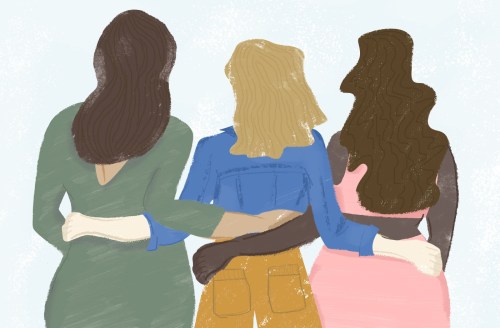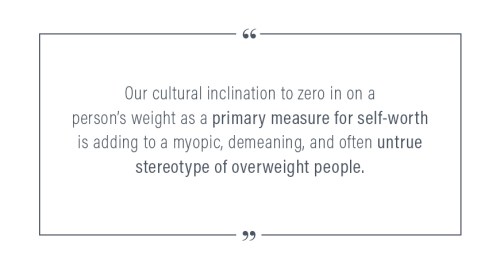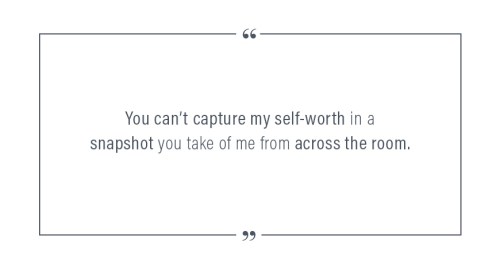Our editors independently select these products. Making a purchase through our links may earn Well+Good a commission
Why we need to stop conflating weight with self-worth
There's a stigma against people who are overweight, but your weight is not a reflection of your health or self-worth. Here's why.

When I was in my mid-20s, I was such a pro at tending to other people that my therapist diagnosed me with “stewardess syndrome”—not a real disorder, but I was certainly an expert at wheeling the metaphorical cart around my life and people-pleasing while completely abandoning my own needs. This changed when I realized that I was so unhappy—the pain of looking at myself in the mirror was so overwhelming—I would only glance at my reflection in a two-inch makeup compact case. A switch in my mind flipped, and, in the process of shedding over 75 pounds, I learned to offer myself the same care, attention, and respect I had shown others for so long.
But this isn’t a story about “how I lost weight and finally learned to love myself.” This is a story about how you—the person shaking my hand for the first time or seeing my picture on Instagram—don’t know how I feel about myself and my body. On any doctor’s chart, I would still be considered overweight today. That’s why I cringe anytime I hear people say—as they often do—things like, “Being overweight is a reflection of how you feel about yourself.” Or, “Our bodies are an outward reflection of our inner selves.”
As Amy Farrell, PhD, author of Fat Shame: Stigma and the Fat Body in American Culture, told Shape magazine last year: “We look at someone who’s fat and see someone who doesn’t take care of herself, and is therefore emotionally unbalanced and unwell.” Online, I’ve seen commenters throw this kind of shade at the size-14 supermodel Ashley Graham: “The girl has a pretty face so it’s a shame she doesn’t take care of herself.” Personally, I’ve come across dating profiles of men specifying their desire for a woman who “must take care of herself/be thin”—that slash a cutting reminder that slimness and self-care are often thought of as synonyms.

They’re not, of course. Making the assumption that I feel worse about myself than a “thin” friend—or that I don’t take care of myself—just doesn’t sit well with me.
But the stereotypes that equate being overweight with a low self-worth are rampant. In fact, several years ago, I worked at Glamour magazine as an editor, and we conducted a poll of more than 1,800 women to probe into the weight stigma that exists in this country. Participants were asked to assign certain adjectives to women based solely on body size, and words like “lazy,” “sloppy” and “undisciplined” were used to describe overweight women up to 11 times more than those qualities were attributed to thinner women. As I sat in a conference room, the survey results spread in front of me, a disturbing picture came into sharp focus: People assume that if you’re overweight, you must think very little of yourself—to the point of being a sloth-like, unmotivated slob.
In the past, I’ve worried that this bias was interfering with my date-ability (remember those, ahem, unfortunate profiles?) or earn-ability. Did former bosses unconsciously or consciously assume that thinner colleagues of mine had more self-worth than I did, and therefore wouldn’t be willing to accept the salaries I was offered? This wasn’t paranoia playing out: Studies have shown that a person’s body mass index (BMI) and their earning power and promotion-potential in the workplace are linked.
We have this idea that we can look at someone and know exactly what’s going on in their minds and lives, or even what they’re capable of. But we can’t. And our cultural inclination to zero in on a person’s weight as a primary measure for self-worth is adding to a myopic, demeaning, and often untrue stereotype of overweight people.

Some will argue that the reason overweight people don’t exemplify self-care is the “fact” that a higher BMI means you’re putting your health at risk. But the real fact is that not all overweight individuals have risk factors for health issues (just like not all people who are labeled as skinny need to “go eat a hamburger” or gain weight to be in good health). In recent years, research has found that BMI is a pretty useless measurement for health.
The truth is, you can’t capture my self-worth in a snapshot you take of me from across the room. I’m human, so I don’t practice self-care perfectly, but I’m no mascot for Team Self-Neglect, either. I’ve stopped confusing being loving toward others with sacrificing myself. I’ve learned that I have more to give when I put my own oxygen mask on first (Stewardess Training 101). I’ve gotten good at saying no to social commitments when I need to prioritize rest, a workout, or even a good scrubbing of the bathroom floors. You might assume my size makes me a doormat, but I’m more likely to show someone the door than roll out the red carpet when I feel taken advantage of or simply not valued.
I’ll say it again: Weight and self-worth are not synonymous. Unhealthy eating habits—including overeating to the point of self-harm and restrictive tendencies—are behaviors that often aren’t reflected in someone’s size. You can be a disordered eater and look like a person with meticulous self-control in the kitchen. In other words, average-weight people may also act out with food—but they’re not the ones who carry the shame of a society that seems set on telling those who are overweight, more than any other group: “You are what you eat.”
Human beings are complex. We’re not what we eat: We are what we think, what we believe, what we do, who we surround ourselves with. And regardless of the body size we each occupy in the world, we probably all have days when our thoughts, beliefs, and actions are closer to an ideal, and other days when they fall short. So why are we stacking the cards against overweight women and men, judging them more harshly for what seems to be a very human experience? And imagine what would happen if we stopped. Because to some extent, feeling good about who we are—and taking healthy actions that support that belief—is a matter of simply being given that right.
Margarita Bertsos—who’s behind the IG account @margaritastraightup—is a health and wellness content specialist in NYC. Her work as a freelance writer has appeared in O, The Oprah Magazine, Women’s Health, Redbook, Glamour, and other publications and digital sites.
If you’re struggling with body image, here are 5 psychologist-approved ways to tame shame. And this is what self-love looks like, according to 11 wellness pros
Sign Up for Our Daily Newsletter
Get all the latest in wellness, trends, food, fitness, beauty, and more delivered right to your inbox.
Got it, you've been added to our email list.










